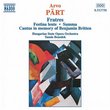| All Artists: Claude Debussy, Maurice Ravel, Sergey Prokofiev, Emmanuel Pahud, Stephen Kovacevich, Katarina Karnéus, Truls Moerk Title: Debussy � Ravel � Prokofiev / Pahud � Kovacevich � Karn�us � Moerk Members Wishing: 0 Total Copies: 0 Label: EMI Europe Generic Release Date: 6/6/2000 Album Type: Import Genres: Pop, Classical Styles: Vocal Pop, Opera & Classical Vocal, Chamber Music, Historical Periods, Classical (c.1770-1830), Instruments, Reeds & Winds Number of Discs: 1 SwapaCD Credits: 1 UPCs: 724355698223, 724355698254 |
Search - Claude Debussy, Maurice Ravel, Sergey Prokofiev :: Debussy � Ravel � Prokofiev / Pahud � Kovacevich � Karn�us � Moerk
 | Claude Debussy, Maurice Ravel, Sergey Prokofiev Debussy � Ravel � Prokofiev / Pahud � Kovacevich � Karn�us � Moerk Genres: Pop, Classical
Acclaimed young flautist Emmanuel Pahud presents a program that contrasts two 20th-century French masters, Debussy and Ravel, with one Russian, Prokofiev. Debussy's Syrinx and La plus que lent are short, beguiling pieces, ... more » |
Larger Image |
CD DetailsSynopsis
Amazon.com Acclaimed young flautist Emmanuel Pahud presents a program that contrasts two 20th-century French masters, Debussy and Ravel, with one Russian, Prokofiev. Debussy's Syrinx and La plus que lent are short, beguiling pieces, the first a languorous flute solo akin to Prélude à l'après-midi d'un faune, the second a dreamy piano waltz. Les Chansons de Bilitis is a delicately sensuous and mysterious six-part suite for piano and flute. The three Chansons Madécasses are Ravel's rarefied settings of folksongs from Madagascar; Katarina Karnéus sings with a beautiful disquiet, exploding into a tormented fury in "Aoua! Aoua!" What initially seems an unusual choice for a finale proves most apt, for it would be easy to mistake Prokofiev's Sonata No. 2 for further French sophistication. Light, eloquent, and playfully melodic, the deft interplay of Pahud's flute and Stephen Kovacevich's piano is far removed from the conventional associations of Russian music. --Gary S Dalkin Similar CDsSimilarly Requested CDs
|
CD ReviewsContinuously in Awe Jessica Brown | Bowling Green, OH USA | 07/19/2000 (5 out of 5 stars) "He impressed you the first time; he'll knock your socks off this time. Emmanuel Pahud, Berlin Philharmonic's Swedish principal flutist, out-does even himself in his re-recording of Prokofiev's Flute Sonata in D, Op. 94, demonstrating matured ideas on the work. In his first recording, 1993, we were enchanted with his sound. We admired his technique. We envied his control. But this new version is pure magic; now we listen in sheer exhilaration. On both recordings, the opening movement displays that gorgeous expansive sound tempered by absolute control. It's not until the second movement, a scherzo, that Pahud's new ideas are reflected. He retains the same tempo from the first recording, but where it once seemed like the piece dictated Pahud's tempo and overall flow, now Pahud seems to invent the piece as he goes. Added nuances in the second version, such as elongating certain notes, contribute to the casual character of the movement. Then, like a surprise attack, he lets you know he means business. This is no ordinary sound. In fact, you may need to remind yourself that this powerful instrument making such bold statements is indeed a flute. Pahud completely controls the instrument throughout the four movements. Changing colors like a chameleon within and in-between movements, his sound first flows like liquid and then all at once pulls in rich overtones to create that fantastically edgy sound that flutists, like myself, fantasize about. The new recording quickens your pulse and leaves you speechless. It isn't just his incredible sound, or impeccable sense of timing, but also the confidence with which he plays demonstrating complete mastery of this music, that will elate you with each listening. Should the piece be retired then with this recording? Unfortunately, no. The one flaw is Pahud's new pianist. Sloppy. He is no Pahud." "Hauntingly beautiful" F. Behrens | Keene, NH USA | 06/14/2000 (5 out of 5 stars) "I once used the expression "hauntingly beautiful" about some songs rendered by a vocalist in my region and he quoted those words out of context in his ads so it looked like I said them about him. Still I must use them about most of the EMI offering featuring the artistry of Emmanuel Pahud (flute), Stephen Kovacevich (piano), Truls Mork (cello), and Katarina Karneus (mezzo). Pahud, by the way, is the principal flutist with the Berlin Philharmonic as well as a much in demand soloist. As is growing common with some companies, there is no discernible official title but the catalogue number is 7243 56982-2. The program starts with...well...hauntingly beautiful renditions of the Debussy pieces: "Syrinx" and "Bilitis," for flute and piano and the semi-satirical "La plus que lente" for piano solo. All four artists contribute to my first hearing of the enchanting set of Ravel's "Chansons madecasses; and we end with the lovely Prokofiev "Flute Sonata in D." Analyses of the these works are briefly provided in the booklet, which also gives us the French and English texts of the Ravel songs. To this hearer, the playing and singing are excellent. A welcome addition to those troublesome collections that "have everything."" A powerful collection Jonathan R. Hill | Cambridge, UK | 12/19/2005 (5 out of 5 stars) "After a series of recordings including "Paris" and the Mozart flute concertos, Emmanuel Pahud has gained renown for the delicacy and silkiness of his tone. Consequently it was something of a surprise for me when i listened to this collection, in which Pahud is clearly exploring the darker sonorities of his instrument. The repertoire itself - including Debussy's Syrinx and an arrangement of his Billitis suite, Ravel's Chansons Madecasses and Prokofiev's flute sonata - is on the whole characterised by bleak, sinister, and often violent expression.
The really pleasurable and exciting thing about this recording is the way he draws out these sinister elements from the mentioned repertoire with a sense of poise and balance that holds everything in check. Thanks to Pahud's extreme (and highly French) musical sensitivity - and of course his dizzying technique - one never feels that he crosses the boundery into the excessive or melodramatic. Take for instance his performance of Syrinx: despite a very understated vibrato, a relatively restrained use of dynamics and a relaxed, spacious tempo, he nevertheless captures the intense despair and anguish belying Debussy's famous composition. Ravel's "Chansons madecasses" is, in my opinion, the highlight of the album, an exquisite display of all that is unique to Pahud's musicality: the interpretation of the first song, "Nahandove", is almost overpowering in its oddly seductive combination of restraint, clarity, tenderness and irony. The miraculous combination of performers solidifies this complex balance, each one aware of the need for unintrusive vibrato and phrases that gently caress as they wind their way through ravel's piquant harmonies. His performance of the prokofiev is similarly notable for its subtlety and tenderness, but, in the second and fourth movements, Pahud reveals his ability to produce explosive power throughout the range of the instrument, proving that, contrary to popular belief, the flute is more than capable of producing the violent, relentless expression this piece demands. Still, this recording is not for everyone. It is not a collection of heart-rending, moving melodies, nor a whirlwind of emotional states, and certainly not a conventionally pretty, easy-listening affair. But it is subtle, ironic, seductive, deceptive, and witty. Pahud is to be praised for continuing to prove that the flute is an essentially French instrument. " |

 Track Listings (15) - Disc #1
Track Listings (15) - Disc #1









